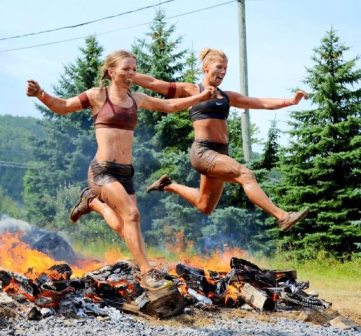 by beCause CEO Nadine Hack – A colleague once said to me, “I stand on your shoulders.” I replied, “We all are part of a chain of progress that stretches far behind us and will continue long after us.” This is how I view leadership in general and women’s leadership in particular.
by beCause CEO Nadine Hack – A colleague once said to me, “I stand on your shoulders.” I replied, “We all are part of a chain of progress that stretches far behind us and will continue long after us.” This is how I view leadership in general and women’s leadership in particular.
See video of presentation.
Research by McKinsey, Harvard, Columbia, and myriad other consultancies, think tanks and universities show that organizations with diverse leadership are 35% more likely to have better financial returns. So, advancing women’s leadership is a vital business imperative. And, I hope men will share with all your male colleagues why “women in leadership” is not just a women’s issue.
What’s valid for women’s leadership applies to all of us, if we can break out of long-held but untrue and unfair stereotypes about what each sex can achieve. There’s extensive research on the unconscious biases we all have about men and women so even if you believe you are an extremely progressive person, you must be vigilant and self-aware about when you might be letting these assumptions affect your judgment.
So, how can we – women and men – stand on the shoulders of others in this long chain of progress? When I was young, I believed it was a sprint and we were going to change everything right then and there so I had to run flat out as fast as I possibly could. As I grew older, I decided it was a marathon and I had to pace myself to sustain my energy for the long-distance haul. And, then as I grew even older, I realized it’s a relay race.
All of us have only been able to do what we’ve done because of those who worked for progress earlier and passed us the baton. While I may never see the fruition of all I’ve worked towards, I have a sacred obligation to move progress forward, along with others who have advanced it against seemingly impossible odds. This is especially true now when we see backlash in many parts of the world and in many sectors: business, technology, academia, sports, etc.
I recently spoke to people from the world of football and asked them how athletes train differently for sprints, marathons and relays. In reviewing this info, I shifted my long-held view of this race analogy as a linear sequence that locks in at different phases of your life. I realized that rather than a sprint being just for when you’re new to leadership or a marathon only when you’re in the middle of your career or a relay exclusively towards its end, you actually can use each form at every stage throughout your leadership journey.
For a sprint, you must perform at your absolute maximum in a very short period time. For a marathon, you must develop your endurance and stamina. In a relay, the race is won in the exchange among team members. Consider when you really need to be in sprint mode, as we often do when under extreme pressure, while remembering that if you always stay in that mode, you will burn out. You carry a sense of being constantly overwhelmed and exhaustion also can lead to serious health consequences.
Stretched, pre-tensed fast-twitch muscles will contract more forcefully and rapidly. To avoid depletion, you must give them a chance to breathe. The very same is for your “leadership muscles;” you must breathe and refresh. You may feel that the overwhelming obstacles you must overcome on a daily basis force you to be in that intense state of readiness at all times. But, you also must give yourself time to nourish yourself, which is vital. Find what renews you. There’s a reason they say “put on your own oxygen mask first.”
Similarly, in marathon mode, you may feel like you’ve been slogging along forever trying to resolve the same issue and you must stay at it always. But, unless you save enough energy for the end of the race, you can get beaten down somewhere at that midway hill.
I know this from experience because I hit empty tank mode in my early 40s and learned the hard way that I had to take time to renew myself regularly or I never would’ve made it to now in my late 60s with my enthusiasm, energy and passion. So, seek out time to nurture yourselves, something we’re all told is selfish – and especially women are taught to nurture everyone but themselves. But refueling is a gift to all: you’ll be a happier person and a better leader! In fact, the two are inextricably connected!
With a relay, you have to be conscious not only of your own pacing but also of the person who will pass to you and the one you’ll pass to, often at an extremely fast pace. So, learn as much as you can about those you depend on and those who depend on you so you can effectively interact in both directions. We all know that no matter how strong we may be, we each depend on others to fulfill our obligations. The “chain is only as strong as its weakest link.”
What’s most compelling about a relay – especially a Ragnar covering 200 miles over several days– is that newcomers and seasoned old timers all experience the camaraderie and support of each other: everyone wins. There’s a wonderful celebratory spirit in completing tasks supporting each other! The physiological training is similar to a classic long-distance race but far greater spans can be covered in a way not possible for any individual to achieve. I hope at some point in your life you’ve had a taste of how great it is to be encouraged and supported: don’t forget that.
Regardless of which mode serves you best at each moment, none of this is not about “whining about how bad things are.” It’s looking reality straight in the face and making conscious choices about what leadership style you’ll use to manage yourself and others. So, when you decide to sprint, do it only for short spurts of time or risk burn-out; when you’re in a marathon, preserve your energy or you’ll exhaust before completion; and when you’re in a relay – which you kind of always are – you’ll be able to endure it better, as you go along, if you celebrate success – yours and that of your team members.
I delight at the prospect of what each of you can attain and I’m cheering all of you on! I welcome your comments on how this race metaphor may help you achieve your goals.
———
This post by Nadine Hack, CEO beCause Global Consulting, was developed from a talk she gave at UEFA Women in Football Leadership Programme. You also can see part of it on YouTube.

